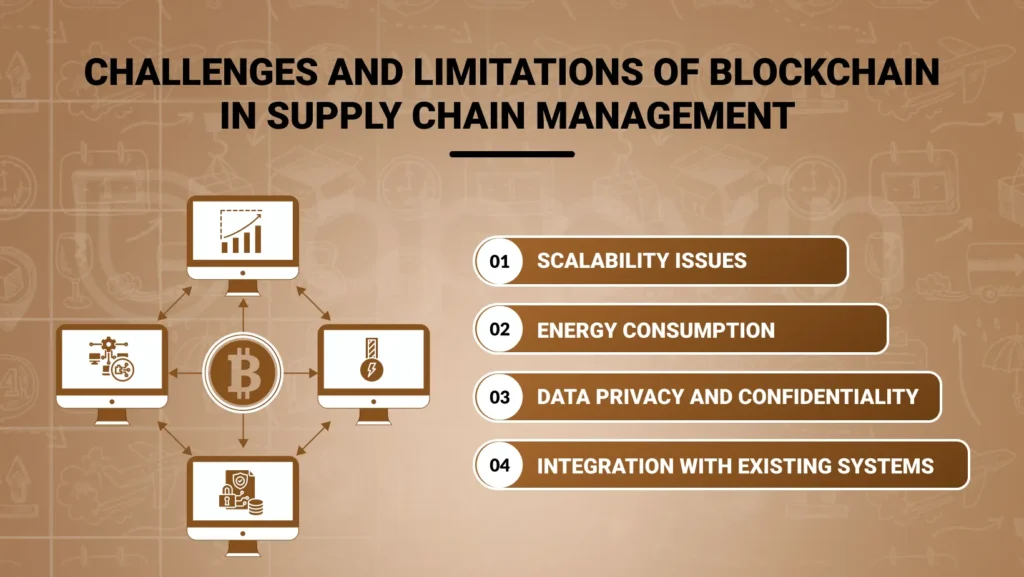The world of supply chain management is evolving rapidly, and blockchain applications for supply chain management in 2025 are set to play a pivotal role. Blockchain technology, known for its decentralized, secure, and transparent nature, is revolutionizing the way businesses manage and track their products from origin to destination. In this article, we’ll explore the future of blockchain applications for supply chain management in 2025, the innovations driving sustainability, and the next-generation solutions that will change how we track products in real-time.
Why Blockchain is Essential for Supply Chain Management in 2025
Blockchain technology has already begun to transform supply chain management by enhancing transparency, security, and efficiency. As we approach 2025, blockchain will become more integrated into the operations of supply chains, offering a range of benefits including:
- Increased Transparency: Every transaction or movement of goods is recorded on the blockchain, ensuring that all parties have access to the same data.
- Enhanced Security: Blockchain’s encryption techniques protect data from being tampered with, ensuring that product information remains secure.
- Improved Traceability: Blockchain allows businesses to trace the entire journey of a product, from raw materials to the final sale, ensuring authenticity and preventing fraud.
As these capabilities continue to evolve, blockchain applications for supply chain management in 2025 will revolutionize industries such as retail, manufacturing, and logistics.
Blockchain Innovations for Sustainable Supply Chain Management in 2025
One of the most exciting developments in blockchain for supply chains is its potential for driving sustainability. In 2025, sustainability will be at the forefront of every business’s supply chain strategy. Blockchain can help businesses make their supply chains more sustainable in several key ways:
1. Ethical Sourcing and Supply Chain Transparency
Blockchain allows businesses to track products from their source, ensuring that raw materials are ethically sourced. By providing a transparent record of every step in the supply chain, companies can prove that their products are sustainably sourced, helping to build trust with consumers.
- Example: A company could use blockchain to track the journey of a diamond from mine to retail, ensuring that it wasn’t sourced from conflict zones.
2. Reducing Waste and Overproduction
Through blockchain, supply chains can become more efficient by eliminating overproduction and reducing waste. Blockchain allows businesses to have accurate data on inventory, demand, and production, allowing for better decision-making and waste reduction.
- Example: Food industries can use blockchain to track perishable goods, ensuring that they are delivered fresh and preventing waste caused by overstocking.
3. Carbon Footprint Tracking
Blockchain will help companies track and reduce their carbon footprints by providing transparent records of the environmental impact of each step in the supply chain. This can be particularly important for industries like fashion, electronics, and agriculture, where environmental concerns are paramount.
- Example: A clothing company could use blockchain to track the carbon emissions from the production, transportation, and delivery of its garments.
Next-Gen Blockchain Solutions for Real-Time Supply Chain Tracking in 2025
One of the most powerful capabilities of blockchain applications for supply chain management in 2025 is the ability to track products in real-time. Next-gen blockchain solutions for real-time supply chain tracking in 2025 will ensure that businesses can monitor the movement of goods from production to delivery with incredible accuracy and speed.
How Real-Time Tracking Works with Blockchain
Blockchain’s decentralized ledger ensures that every step in the product journey is recorded in real-time. As products move from one location to another, data is updated on the blockchain, giving stakeholders instant access to the latest information.
- Key Benefits of Real-Time Tracking:
- Improved Accuracy: Real-time data allows businesses to have an up-to-date view of their supply chain, reducing the chances of errors.
- Faster Decision-Making: With access to real-time information, businesses can make quicker, more informed decisions regarding inventory management, shipping, and production.
- Better Customer Service: Real-time tracking allows businesses to provide customers with accurate updates on their orders, improving customer satisfaction.
Examples of Next-Gen Blockchain Solutions for Tracking
- Food Industry: Blockchain can enable real-time tracking of perishable goods, such as fresh produce or frozen foods, ensuring they are delivered at their peak freshness.
- Pharmaceutical Industry: Blockchain can be used to track medical supplies and pharmaceuticals, ensuring that drugs are stored and transported under the right conditions, maintaining their efficacy.
The Benefits of Blockchain in Supply Chain Management by 2025
By 2025, blockchain technology will provide businesses with several benefits in supply chain management:
| Benefit | Description |
|---|---|
| Enhanced Transparency | Blockchain allows businesses to see the full history of their products. |
| Reduced Fraud | Blockchain ensures that products can be verified for authenticity and quality. |
| Improved Efficiency | Real-time tracking and automation reduce manual intervention and errors. |
| Cost Reduction | The automation of processes helps reduce operational costs and improve margins. |
| Sustainability | Blockchain helps track the carbon footprint and ethical sourcing practices. |
Steps for Implementing Blockchain in Your Supply Chain by 2025
Integrating blockchain technology into your supply chain requires careful planning and execution. Here are the key steps for implementing blockchain applications for supply chain management in 2025:
Step 1: Identify Key Supply Chain Challenges
Before implementing blockchain, businesses must identify the key pain points in their supply chain, These could include issues related to transparency, fraud, inventory management, or sustainability.
Step 2: Choose the Right Blockchain Platform
There are many blockchain platforms available, each offering different features. Some platforms are specifically designed for supply chain applications, while others offer general blockchain solutions ,Businesses should choose the platform that best suits their needs.
- Example: IBM’s Food Trust Blockchain is a popular choice for food supply chains, while VeChain offers blockchain solutions for various industries. Including logistics and manufacturing.
Step 3: Partner with Blockchain Experts
To successfully implement blockchain. Businesses may need to partner with blockchain consultants or technology providers who specialize in supply chain management. These experts can guide businesses through the process and ensure smooth implementation.
Step 4: Integrate Blockchain with Existing Systems
Blockchain should be integrated with your existing systems, such as inventory management, transportation, and CRM systems.To ensure a seamless flow of data. This will enable real-time tracking and automated decision-making.
Step 5: Train Employees
Employees need to be trained on how blockchain will impact their day-to-day operations. Training will ensure that everyone understands how to use blockchain to improve supply chain operations.
FAQs About Blockchain Applications for Supply Chain Management in 2025
Q1: How does blockchain ensure transparency in supply chain management?
Blockchain records every transaction in a secure and immutable ledger, allowing all parties involved in the supply chain to access the same information in real-time, ensuring complete transparency.
Q2: What industries will benefit most from blockchain in supply chain management?
Industries such as retail, pharmaceuticals. Food production, and manufacturing are expected to see the most significant benefits from blockchain due to their need for transparency, traceability, and efficiency.
Q3: Can blockchain help reduce supply chain fraud?
Yes, blockchain ensures that every product is traceable and tamper-proof. Helping to reduce fraud and counterfeit goods in the supply chain.
Q4: What role does blockchain play in sustainability in supply chains?
Blockchain helps track the carbon footprint and ethical sourcing of products. Providing consumers with transparent information and enabling businesses to make more sustainable choices.
Conclusion
Blockchain applications for supply chain management in 2025 will continue to transform industries by offering greater transparency, security, and efficiency. With next-gen blockchain solutions for real-time supply chain tracking in 2025.Blockchain innovations for sustainable supply chain management in 2025. Businesses will be able to optimize their operations, reduce costs, and enhance sustainability efforts. As blockchain technology advances. Companies that embrace these changes will be well-positioned to thrive in a future that demands transparency and innovation in the supply chain.





